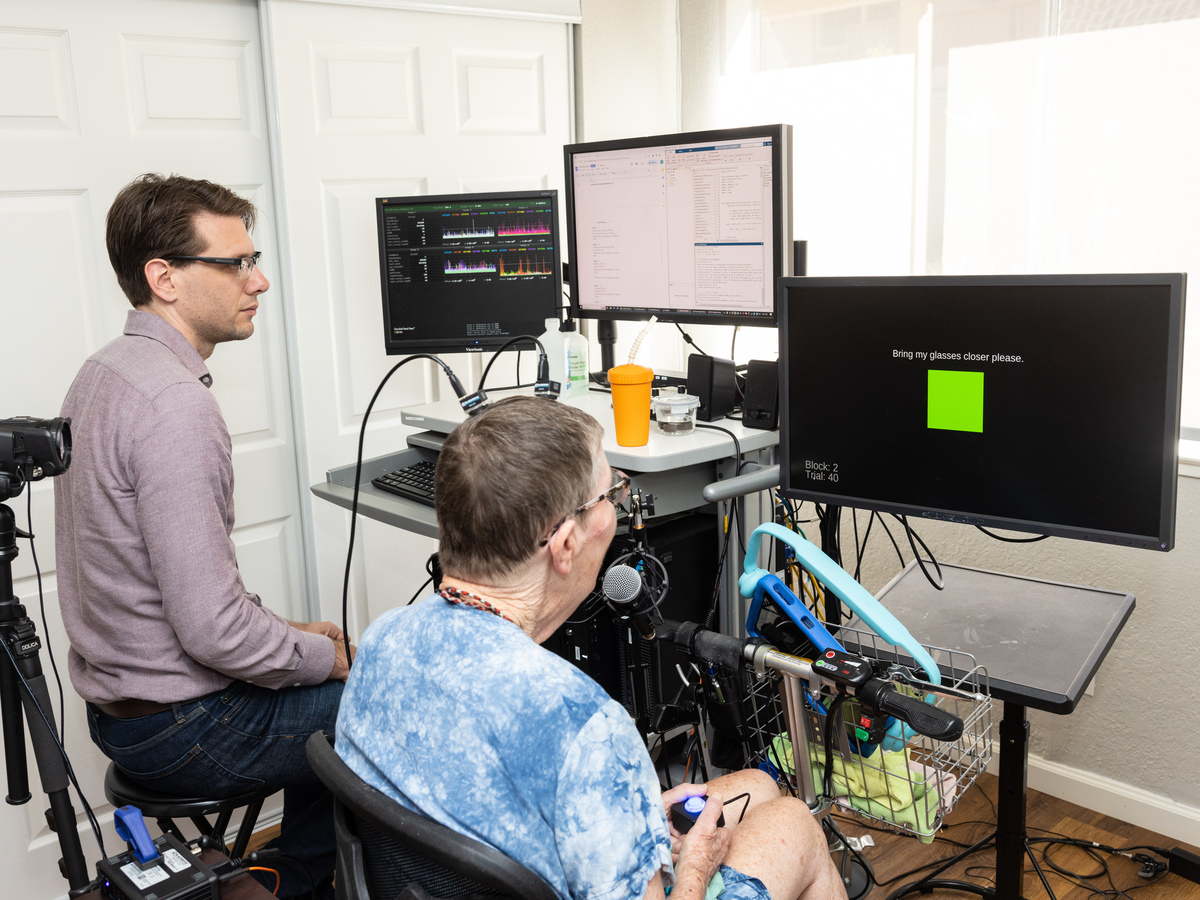
Pat Bennett takes part in a research session, using a brain-computer interface that helps translate her thoughts into speech.
Steve Fisch/Stanford University
hide caption
toggle caption
Steve Fisch/Stanford University
Pat Bennett takes part in a research session, using a brain-computer interface that helps translate her thoughts into speech.
Steve Fisch/Stanford University
For Pat Bennett, 68, every spoken word is a struggle.
Bennett has amyotrophic lateral sclerosis (ALS), a degenerative disease that has disabled the nerve cells controlling her vocal and facial muscles. As a result, her attempts to speak sound like a series of grunts.
But in a lab at Stanford University, an experimental brain-computer interface is able to transform Bennett’s thoughts into easily intelligible sentences, like, “I am thirsty,” and “bring my glasses here.”
The system is one of two described in the journal Nature that use a direct connection to the brain to restore speech to a person who has lost that ability. One of the systems even simulates the user’s own voice and offers a talking avatar on a computer screen.
Right now, the systems only work in the lab, and require wires that pass through the skull. But wireless, consumer-friendly versions are on the way, says Dr. Jaimie Henderson, a professor of neurosurgery at Stanford University whose lab created the system used by Bennett.
“This is an encouraging proof of concept,” Henderson says. “I’m confident that within 5 or 10 years we’ll see these systems actually showing up in people’s homes.”
In an editorial accompanying the Nature studies, Nick Ramsey, a cognitive neuroscientist at the Utrecht Brain Center, and Dr. Nathan Crone, a professor of neurology at Johns Hopkins University, write that “these systems show great promise in boosting the quality of life of individuals who have lost their voice as a result of paralyzing neurological injuries and diseases.”
Neither scientists were involved in the new research.

Thoughts with no voice
The systems rely on brain circuits that become active when a person attempts to speak, or just thinks about speaking. Those circuits continue to function even when a disease or injury prevents the signals from reaching the muscles that produce speech.
“The brain is still representing that activity,” Henderson says. “It just isn’t getting past the blockage.”
For Bennett, the woman with ALS, surgeons implanted tiny sensors in a brain area involved in speech.
The sensors are connected to wires that carry signals from her brain to a computer, which has learned to decode the patterns of brain activity Bennett produces when she attempts to make specific speech sounds, or phonemes.
That stream of phonemes is then processed by a program known as a language model.
“The language model is essentially a sophisticated auto-correct,” Henderson says. “It takes all of those phonemes, which have been turned into words, and then decides which of those words are the most appropriate ones in context.”
The language model has a vocabulary of 125,000 words, enough to say just about anything. And the entire system allows Bennett to produce more than 60 words a minute, which is about half the speed of a typical conversation.
Even so, the system is still an imperfect solution for Bennett.
“She’s able to do a very good job with it over short stretches,” Henderson says. “But eventually there are errors that creep in.”
The system gets about one in four words wrong.

An avatar that speaks
A second system, using a slightly different approach, was developed by a team headed by Dr. Eddie Chang, a neurosurgeon at the University of California, San Francisco.
Instead of implanting electrodes in the brain, the team has been placing them on the brain’s surface, beneath the skull.
In 2021, Chang’s team reported that the approach allowed a man who’d had a stroke to produce text on a computer screen.
This time, they equipped a woman who’d had a stroke with an improved system and got “a lot better performance,” Chang says.
She is able to produce more than 70 words a minute, compared to 15 words a minute for the previous patient who used the earlier system. And the computer allows her to speak with a voice that sounds like her own used to.
Perhaps most striking, the new system includes an avatar — a digital face that appears to speak as the woman remains silent and motionless, just thinking about the words she wants to say.
Those features make the new system much more engaging, Chang says.
“Hearing someone’s voice and then seeing someone’s face actually move when they speak,” he says, “those are the things we gain from talking in person, as opposed to just texting.”
Those features also help the new system offer more than just a way to communicate, Chang says.
“There is this aspect to it that is, to some degree, restoring identity and personhood.”










